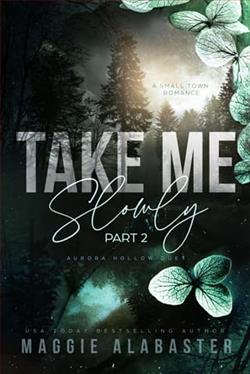Page 27 of Our Last Vineyard Summer
“Well, maybe she has something important to say.”
Don’t be afraid to ask for love.Virgie had seen the woman holding the sign just before she left New York around Christmas; it had inspired Virgie to open her change purse and toss two quarters into the woman’s paint can labeledTIPS.
As the plane set off into the sky, Virgie wished she and Louisa were closer. She wished she was closer to all her girls, and she wondered what other women did to develop a deeper relationship with their daughters. There were women she knew who forced their daughters to engage in activities they enjoyed—shopping, lunching, tennis. Other mothers won over their girls by being a passive but supportive presence in the home, tidying the sheets in the closet while casually sweeping into their bedroom to talk. Some mothers wanted their girls to be just like them; others hoped they were nothing alike. Virgie and her girls were always coming and going, sharing meals, playing Scrabble, reading—and yet, sometimes each one of them felt like a puzzle she was perpetually trying to unlock. They were exhausting. Maybe Virgie wasn’t the type to bake Christmas cookies, and she wasn’t trying to learn piano so she could help Betsy practice. But she would continue to make lunches and wash the breakfast dishes and drill them about their lives, all while battering herself for what she didn’t do right or what she didn’t say.
An idea for an article came to Virgie then. An essay called FLYINGLESSONS, the subhead: WHATI WANTMYDAUGHTERS TOKNOWABOUTBEING AWOMAN.
Charlie wanted her to forget her column. Fine, she’d forget it. It was already gone.
The essay couldn’t offend Charlie. It was nothing but a mother giving her daughters advice. A different kind of romance. The premise as benign as they come, and for Virgie, this wasn’t about ambition or making a name for herself. It was simply about speaking her truth.
CHAPTER ELEVEN
James was sitting on the front steps reading a library book when they pulled into the driveway. From afar, his limbs looked longer than Virgie realized, and the contours of his face were beginning to chisel, a boy on his march to puberty. He jogged down to the driveway in shorts and sneakers, a tiny hole forming in the canvas near his big toe.
“Aren’t you supposed to be at the regatta?” Virgie turned off the idling car and got out with a wide grin, still on a high from the flight. She’d thought he was racing that morning.
The boy’s hair was slicked back with gel, and he sucked in a breath like he had something important to say. For a moment, Virgie thought he might profess his love for her young daughter. “I was up late,” he said. His eyes tracked Betsy as she emerged from the car, clutching her stomach. “Can you play?”
She groaned, running to the back door. “I might yak.”
Virgie slammed the trunk. “We went flying in Wiley’s plane, and the movement didn’t agree with her.” There were plumlike circles under his eyes. “Why were you up late?”
The boy bent down to the ground, using his hands to trap a cricket. “Got him!” James’s expression lit up—he was stuck at that confusing age where he had enough muscle to do twenty push-ups, but all he wanted was to play with his plastic soldier figurines. He opened his cupped hands to give Virgie a peek at the creature. “People think they’re so hard to catch, but I know how to make them feel safe.”
“You watch everyone around you, don’t you? You know how to make your mother feel safe too.”
He didn’t take his attention off the cricket, and Virgie was set to give up on him saying anything more when he said quietly, “Sometimes she drinks from a bottle.”
Virgie crouched beside him, intuiting that he was sharing something important. “What kind of bottle?”
He licked his dry lips, keeping his gaze trained on the insect cupped in his hands. “I dunno. The red stuff usually makes her cry; the brown stuff just makes her mean.”
Pamela’s house had seemed so immaculate. There hadn’t even been a bar cart. Then again, Virgie’s mother had hidden her bottles with the cleaning products under the kitchen sink. It dawned on her then why James had continuously checked up on his mother in the kitchen when she’d come over to cook dinner for the first time.
“Why don’t you come inside for a while, dear. I’m sure Betsy will be ready to go watch the regatta after she recovers from this morning. Sound good?”
The child lowered his hands to the grass. It took the cricket only a few hops to jump from sight, and James stood, pushing his hands in his pockets. He followed Virgie up the house steps. “Do you know crickets have incredible vision?” he said. “They can see all different directions at the same time.”
“Just like you,” she said. “You have seen so much.” A tender bruise palpated her chest, the memory of her own mother sitting outside onthe patio of their house in broad daylight, a cigarette in one hand and a glass of water in the other.
Only years later did Virgie realize that it wasn’t water at all.
On the couch, Betsy had her color-drained cheeks pressed up against the back cushions while James worked on a puzzle. She’d refused to leave the house since her stomach was still queasy with airsickness, and if she wasn’t going to the regatta, Aggie declared she wasn’t going either. James followed suit, calling his mother to explain but finding no answer.
“What do ginger chews taste like?” James tried to fit a puzzle piece into the unfinished map of the continental United States. Betsy adjusted her headband. “Dirty socks,” she said, and they fell into a pile of laughter. Virgie left the two of them behind on the sofa and called her older girls into the kitchen. They made clear their displeasure with well-timed huffs, the teenagers settling into the banquette, the sun streaming through the windows behind them.
“What are you going to torture us with now?” Aggie flicked a toast crumb across the table.
“Well, there’s something I want you to do with me.” Maybe this was how she’d be closer to her girls, by teaching them just how much harder they would have to work in life. Handing both of her daughters a stenographer notebook and a sharpened pencil, she started on the speech she’d been gathering in her head. How humans were put on this earth to reach their potential, but how could her girls reach their potential unless they knew what to reach for. Women without plans faltered; women with plans went places.
Louisa crossed her long, slender legs. “Mom, can’t we just play Scrabble or something?”
The house was a mess; a stack of fresh laundry was folded on the coffee table, breakfast dishes and juice glasses from the morning in thesink. “Would you rather clean the house?” Virgie ran her finger along the baseboard of the kitchen, holding it up to show them the dust. “There’s plenty else to do, if you’d rather.”
“Nope, not me.” Aggie threaded her hair up into a high ponytail, readying for the challenge. “I have lots of potential I’d rather discuss.”
“Good. Let’s jot down our goals. Remember, life goals can be anything.” Here she emphasized her next words, a bit of sarcasm in her voice: “Goal one. Be kinder to my sisters. Goal two. Give my mother a break sometimes.”















